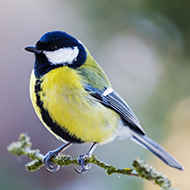Bird genes reveal impact of city living

(he scientists examined the genome of 192 great tits from nine European cities.
A new study conducted in collaboration with the University of Glasgow has found that birds living in cities are genetically different to those living in the countryside.
The research, published in Nature Communications, found clear genetic differences between great tits in urban areas and great tits in rural areas. The study is the largest of its kind to see how urban environments affect the genome.
In the study, scientists examined the genome of 192 great tits from nine European cities and found that, in order to handle their environment, the birds all evolved in a similar way.
Their research shows that, in city birds, different genes linked to vital biological functions regulated by serotonin – such as aggression and circadian rhythms - are selected and passed down the generations. Conversely, in rural birds, the genes that control these same functions do not confer the same biological advantage.
Caroline Isaksson, a senior lecturer at Lund University, which led the study, said: “This indicates that these behaviours, and cognition, are very important in order to live in urban environments with a lot of stress in the form of noise pollution, light at night, air pollution and constant proximity to people.”
Dr Pablo Salmón, from the University of Glasgow, added: “It is surprising that cities, which from an evolutionary perspective are a recent phenomenon, are already leaving their footprint in the genome of birds.”



 The Veterinary Medicines Directorate (VMD) is inviting applications from veterinary students to attend a one-week extramural studies (EMS) placement in July 2026.
The Veterinary Medicines Directorate (VMD) is inviting applications from veterinary students to attend a one-week extramural studies (EMS) placement in July 2026.